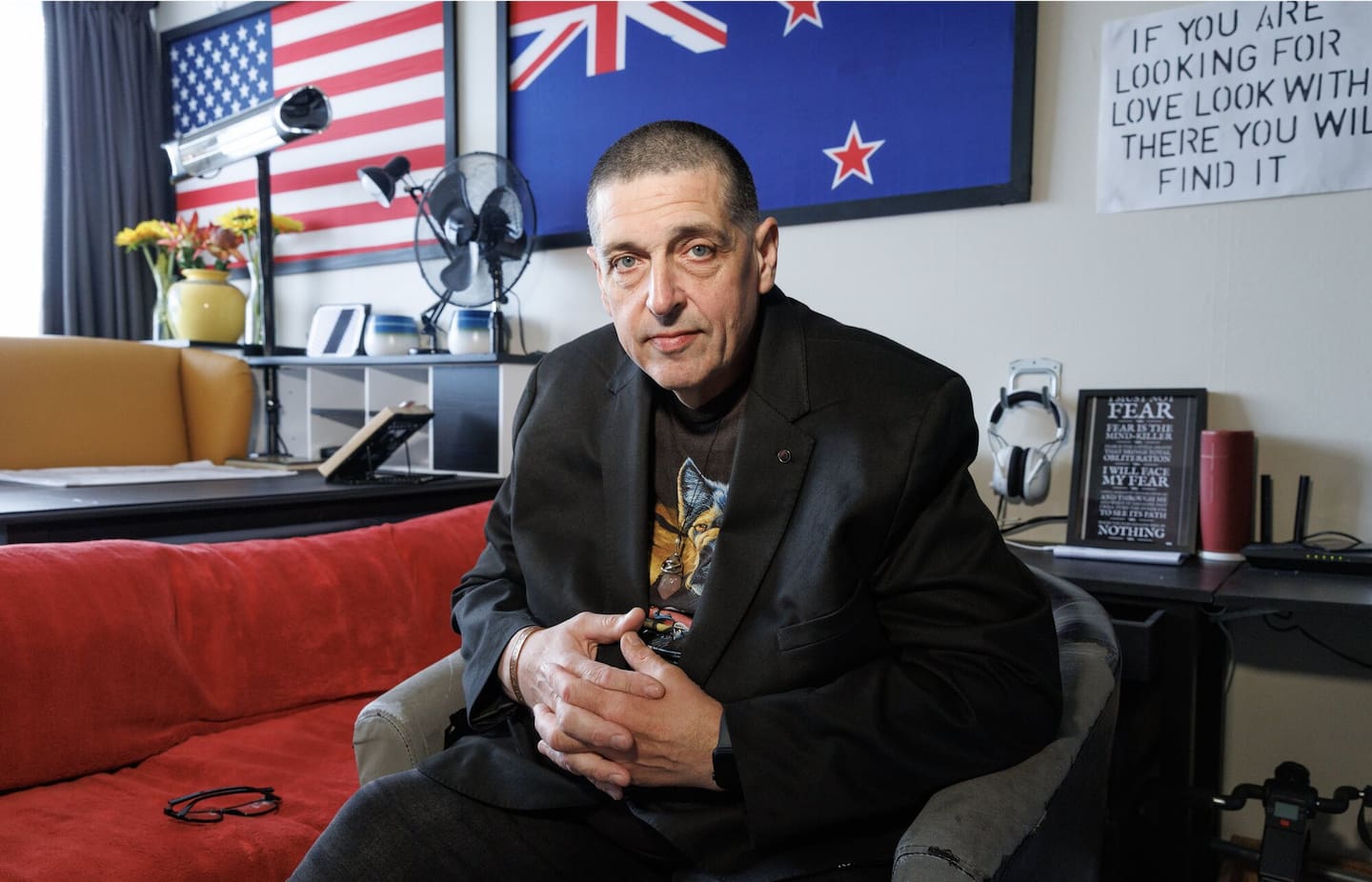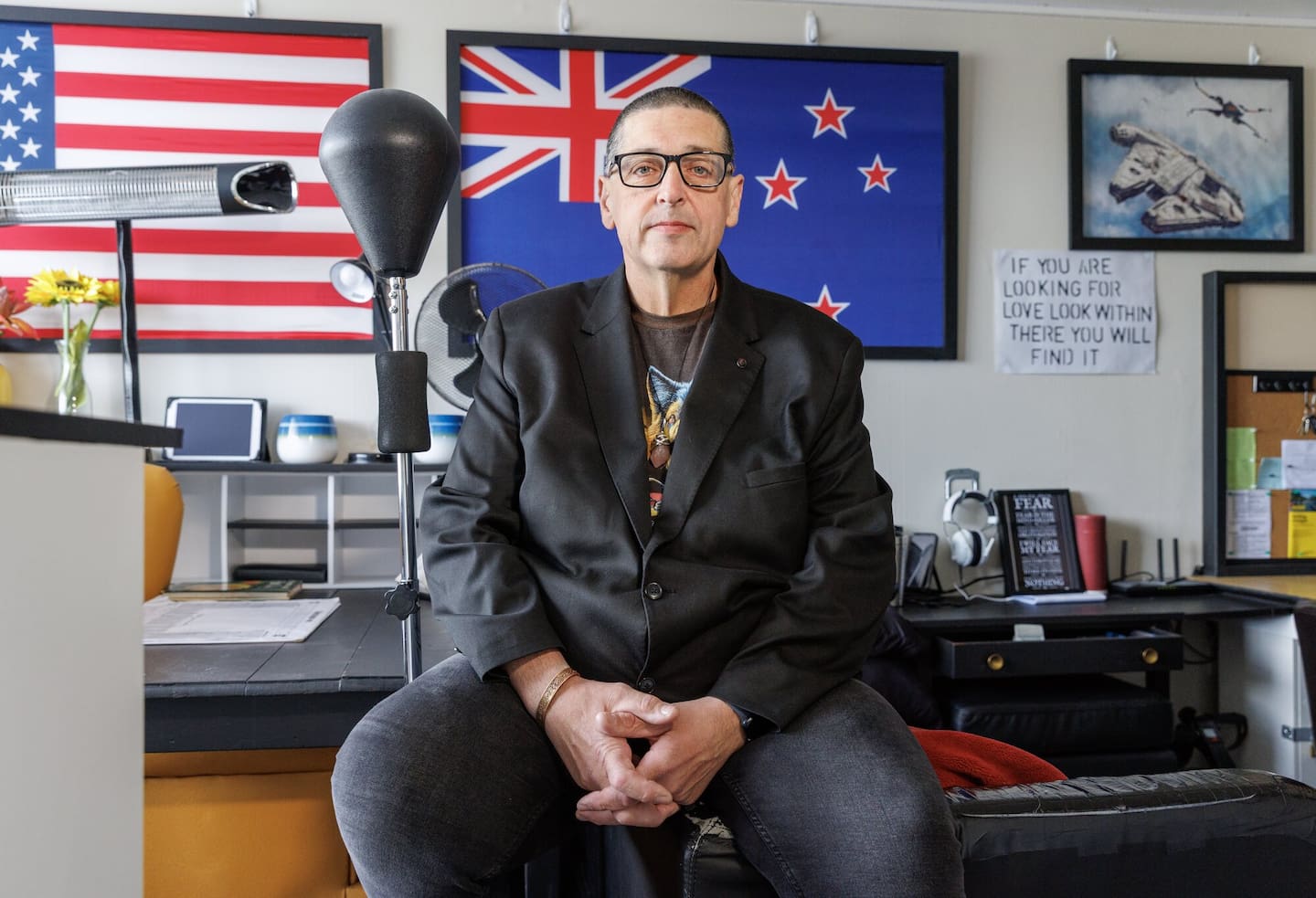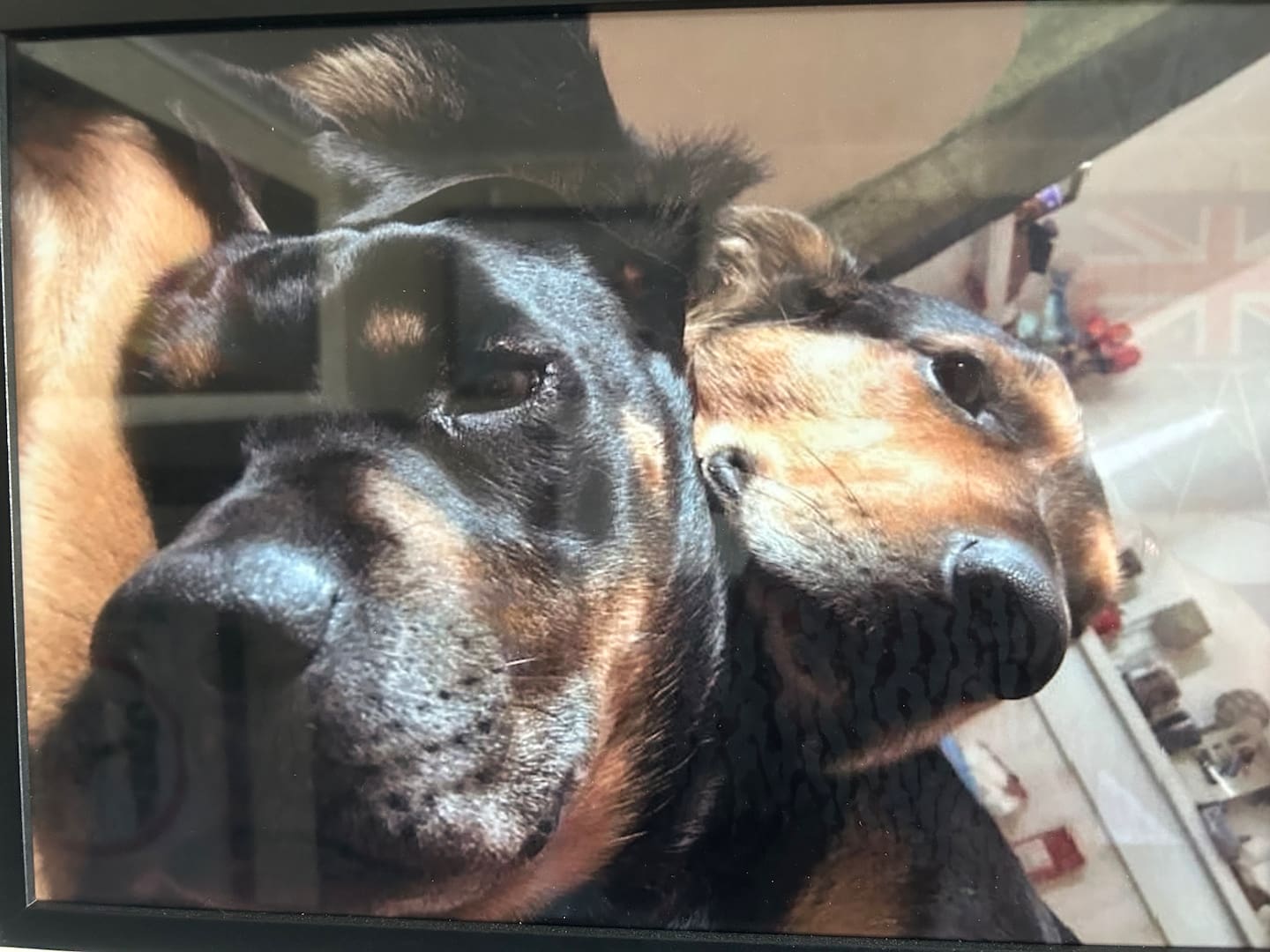Former Invercargill truck driver Graeme Yianakis was finishing a night shift when a car crossed the centre line and struck his vehicle, killing the car’s passenger and driver. Yianakis speaks exclusively to Katie Harris about the heartbreak of surviving and his ongoing battle for support.
After the crash, Graeme Yianakis was afraid to sleep.
“When I had my eyes closed, all I would see was the accident, repeated over and over.
“I just about went insane.”
Being awake, with the knowledge that the occupants of the other vehicle didn’t make it, felt just as bad. Life for Yianakis had become its own kind of hell.
“It was just the worst kind of nightmare you can think of.”
A lot has changed since that morning, the early hours of March 31, 2017.

Graeme Yianakis warns other truck drivers to seek help if they are in a similar situation. Photo / Mark Mitchell
Back then, the trucker was married and making good money working overnights as a line haul driver.
After the accident, Yianakis lost his marriage, home, and job.
He now lives in a council flat in Wellington, with physical and mental injuries that make full-time work feel impossible.
On the road
Yianakis witnessed many close calls during his decades behind the wheel.
“Sometimes you go out and think, ‘Will I make it back?’ You never know. That’s how bad it can be.”
Having nearly been run off the road twice, Yianakis knew the fragility of his own mortality while driving, but nothing prepared him for being the sole survivor in a double fatal crash.
It happened around 3am, shortly after a trailer swap on the back end of his overnight shift.
“I remember looking out the window before the accident and seeing clear skies, a full moon. When you have clear skies and a full moon it’s quite bright.”
As Yianakis closed in on the turnoff to Dunedin Airport, travelling southbound at 88km/h, he was blinded by a different kind of glow.
“All I remember are the headlights.”
Suddenly, a car was heading towards him on the wrong side of the road, going “bloody fast”.
He flashed his lights.
“I basically thought, ‘What the f***’, and I turned left and you can’t actually swing the wheel, so I just tried to slightly move it left so [the car] would miss me.
“I held on to the steering wheel and the pedals with my life.”
His efforts to avoid a collision were in vain. The car struck head-on.
There was “nothing left” of the other vehicle, which had an estimated pre-crash speed of 110km/h; it was in “smithereens”.
Only the sound of a dying man crying out for his mother remained, Yianakis told the Herald.
‘Watch the road’
According to the Coroner’s findings, the driver, Cody Cowie, had multiple drugs, including Midazolam, noroxycodone, and alcohol in his system.
A bag containing packaged needles and a sharps container was located in the front passenger footwell of the car.
The doctor examining Cowie found he died from injuries suffered in the collision, combined with the use of alcohol and benzodiazepine.
Erica Kay Ward, the passenger, died from lethal traumatic injuries and also had “multiple centrally acting drugs and alcohol detected in low levels”.
Coroner Marcus Elliott. Photo / Michael Craig
Yianakis said the first person on the scene was another truckie, then an ambulance, then police.
While investigating the deaths, police found the vehicle’s boot full of freshly cut cannabis, which police believed had been harvested or stolen shortly after the pair obtained the car from a friend.
Authorities concluded the Hyundai driven by Cowie had veered across the centreline into the southbound lane, crashing into the truck.
Coroner Marcus Elliott said Cowie’s blood alcohol level was substantially higher than the legal limit and he did not brake before the point of collision.
While he noted there was a possibility that Cowie deliberately drove into the truck, there was no evidence of any suicidal intentions.
“It is more probable than not that he veered unintentionally across the centreline and into the path of the oncoming truck due to the effects of alcohol and/or cannabis and/or fatigue.”
Accident ‘on replay’ in trucker’s mind
Yianakis didn’t believe he had any physical injuries at the time of the crash, so instead of being checked over at a hospital, he was taken to the Mosgiel police station.
“‘We wanted you here because we want to tell you they both died. Are you okay with that?’”, he alleged police said.
“I was sort of like, ‘Not really’. I wasn’t happy, I had some tears, was quite emotional.”
An insurance report from the day of the collision, provided by Yianakis, noted he had a sore foot. He believes the injury, scribbled down by him in messy text like a minor afterthought, would later contribute to his downward spiral.
“I didn’t understand anything about accidents at that time. I’d never been in one. I didn’t know anything about head injuries.”
He took counselling sessions offered by his workplace but said he never saw a doctor.

Graeme Yianakis still blames himself for the deaths. “My truck killed them, they died. If my truck wasn’t there, they wouldn’t have died." Photo / Mark Mitchell
“I thought nothing of the incident, I signed the paperwork. It never even occurred to me.”
Yianakis came to regret this - now believing the shock of the incident gave him an artificial sense of well-being.
Then a month or two later, the nerves began.
“I didn’t understand what it was, I just felt stressed or nervous when I was driving.
“I started freaking out when driving the truck. You feel like you’re losing your mind, that’s how bad it was. I got to the point that I could barely do it.”
After leaving that job, Yianakis said he bounced through several others, often moving on over safety fears that had gripped him since the accident.
“People hated me for it, because if I saw anything that was dangerous or unsafe, I’d tell them. I’d actually yell at them sometimes.”
In the years after the accident, he was diagnosed with post-traumatic stress disorder.
“Every waking moment I’d see the accident replay over.”
‘My truck killed them’
Doctors also identified injuries to his back, which he believes were caused by the accident, and he began suffering pain in his legs, hips, and back.
“I was basically in constant pain, it didn’t happen straight away, but a year or two later, I had to start taking painkillers for the pain.”
Like his career, he said his marriage crumbled and his two elderly dogs died.
“They were all I had left.”

Graeme Yianakis's pups, Bella and Pereus. Photo / Supplied
No matter how many people said the crash wasn’t his fault, Yianakis still felt he was responsible.
“My truck killed them. If my truck wasn’t there, they wouldn’t have died. You can’t really do much with 50-tonne vs 1-tonne at that speed. You question yourself all the time, ‘Could I have done anything else?’”
The last five seconds of the crash are still on repeat in his head.
“I couldn’t go to sleep, because if I went to sleep, ... all your dreams are nightmares.”
As time went on, he said the pain in his legs and around his back became unbearable.
“[The doctor] said your back is basically destroyed.”
He then contacted ACC but was told he was not eligible for support for the physical injuries.
Yianakis has been fighting for ACC coverage for years, but said the agency only agreed to cover him for mental injury.
ACC acting head of client recovery Matthew Goodger said his thoughts were with Yianakis over the trauma he experienced as a result of the accident.
“Following the accident in 2017, no claim was received for any physical injuries.
“Two years later, in 2019, a request to cover concussion was received but was declined as it had been more than 12 months since the accident occurred and there was no medical evidence to support cover.”
Goodger said another claim was received in 2024 for mental trauma experienced because of the accident.
“Graeme was granted cover for PTSD. We have approved funding for psychological support.”
Goodger said Yianakis had a dedicated ACC recovery coordinator, support from his GP and his advocate.
Yianakis hoped other truckies didn’t end up in the same position. But if they do, they should ask for help immediately.
“If you don’t, look what can happen. You try to be strong, but unfortunately, your body isn’t; it’s weaker than you think.”
Katie Harris is an Auckland-based journalist who covers issues including sexual assault, workplace misconduct, media, crime and justice. She joined the Herald in 2020.
Take your Radio, Podcasts and Music with you









